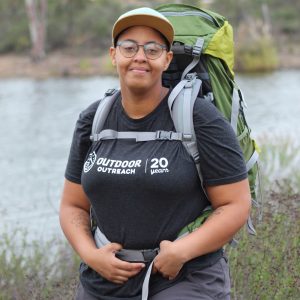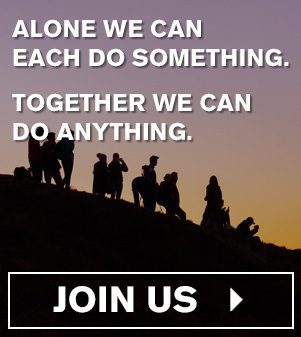Lexus Morrow
Youth Programs Assistant Coordinator, Outdoor Outreach, San Diego

Lexus Morrow was no stranger to Outdoor Outreach, an organization that gets San Diego kids into the outdoors, when she joined its staff last year: She went through the program herself when she was in high school, and ultimately built her career off of the passion for outdoor education she fostered with them. Program leads at Outdoor Outreach brought her rock climbing and surfing and gave her access to places that were previously unreachable to her, without a car, in a city where a 15-minute car ride to the beach can take hours by bus.
As the country looks to quickly make fundamental changes to access and inclusion for BIPOC across the board, Morrow says creating more equitable access to the outdoors isn’t just important, it’s urgent. “Get people back into nature, and I think you get people back into the root of who they are,” she says.
We asked Morrow about her experience with Outdoor Outreach and her hopes for the tens of thousands of students that have gone through its programs.
What was your experience with Outdoor Outreach like?
It was basically my introduction to the outdoors. I was in foster care from basically when I was an infant until I was about 10 years old, and in those 10 years, I was very much in the outdoors, in the backyard, riding my bicycle. I was a kid that played in the dirt outside of our house, or in a park. But when I want back to live with my mother after I was 10, I lost that innocent connection with the outdoors.
I was very much an antisocial kid, very isolated—I always had my head in a book, wanting to get through school as fast as possible, so I can go off to college and get away from everything, that I didn’t really think about doing anything fun. In 10th grade, a teacher kind of pressured me into joining Outdoor Outreach—she told me she’d give me extra credit on a few assignments if I went.
It’s amazing how easy trust comes, in these activities, in the outdoors. I wasn’t a trusting kid, but it was easy because these people from Outdoor Outreach were there. They were really focused and really passionate about making sure me and the other students with were having fun, that we were eating right, that we were drinking. They were all about “challenge by choice,” so we could sit out or stay on the beach and play and make sandcastles.
They weren’t expecting anything out of us, just to be there. I hadn’t had that in a long time in my life. I think that’s really what kind of changed me, as a person. Having someone just to be there without any preconceived notions about me, just wanting me to be happy.
How have you seen students respond to programming?
As a kid who was once in these programs, I can say that it’s a dramatic difference. One student I talk about all the time came in and was like, “I’m never going to rock climb.” And then she got on the rock climbing wall and didn’t want to get down. She did all four routes and then rappelled, and it was the funnest thing she could do. Another student was really afraid of heights. He managed to get up the wall and told me that some parts were difficult and he wanted to stop, but he kept going. And he said he could take that into his life, how he’s really bad at school but knows he can do it now because he rock climbed. It was a physical manifestation of something he didn’t think he could do, and so he said, “If I can do this, then I can totally finish school.”
Another student was really depressed. She came to our programs and was smiling and laughing and saying she’s really happy that she came. Kids tell you that they found their best friend, that they found an activity that they love. You see smiles and joy on the faces of kids who, when they first came in, they were closed off and didn’t want to talk to anybody and they were afraid that they would be judged by what happened in the past or what they did or their mental health issues. It’s just amazing. In eight weeks, we see such a remarkable change in these kids. It’s like looking at totally different children.
What are your hopes for the students you work with?
I hope they realize that what we’re giving them isn’t something that should have ever taken us to give it to them. That this is out there, and it’s theirs, and if they want it that they can go get it.
As much as these activities and these people are there for them, nature is also there for them, and it can be as calming and as healing as they need it to be. It’s an amazing place. It’s an amazing resource that people can use to really take control of their lives, and of their future.
It really should be something that’s there every day, that they have access to, and that they can say yes or no to. But they’re being told that they don’t have access to it, and I just want to be able to make sure that they get to these places they see on TV. These are our places. It’s not the people on TV’s place; it’s ours. And we have just as much right to it. We just have to figure out a way to give them access to it, when it should have already been given to us in the first place.
What changes can we work toward in the near future to increase access to the outdoors?
I think we need to get knowledge to people about the places they can go to recreate. Here’s where they can go to rock climb, or take beginner classes in swimming, and make sure that the information is everywhere so people can see it.
Another big thing is transportation. I never would have been able to get to the beach or anything like that, or do any of these things, if I had to get there myself. Transportation is huge.
I live in San Diego and I’m like 15 minutes by car from the beach, but it takes about three hours by bus to get there. You go the long, long way around, and most bus stops aren’t in front of the beach, they stop like a half a mile from the beach.
So if you have kids, or a car seat, or anything like that, and you want to take your family, and you don’t have a car, then you’re walking your kids down the street from the bus stop, lugging all of your stuff, your food, your water, your toys, your umbrella, all that, to get to the beach for a few hours of fun. And then you have to get back on the bus, for another two-hour journey home. The payoff isn’t worth what you have to put into it. So people don’t go. What’s the point of me going to sit on a beach for two hours if I have to spend four hours getting there? If you want to improve access, then the transportation needs to be there.
We also need to increase awareness that, for some people, the outdoors isn’t somewhere that they see themselves. That was a big thing for me—if I see someone who looks like me, I’m far more comfortable being in the outdoors. We need to make sure that if we’re going to get people outdoors, we get them outdoors in a diverse setting, so they’re not the only Black kid in a group of Asians or in a group of white people.
Why is it so urgent to increase access?
It should be here already. It’s so important because it should already exist, and it doesn’t. I think it’s important that some people don’t know about these places and these spaces, and they don’t know that they’re allowed to go. It’s not fair, and really we have seen over generations and decades how much we have lost, in terms of mental, physical, and emotional health. Nature makes healthier people, it makes better people and stronger people. And it makes a stronger planet.
We’ve lost so much of the planet—animals, people, generations of kids, as adults, with diabetes and suicide and mental health issues and physical issues. I think it really stems from the fact that we have lost our contact with the world around us, and because we don’t have the equity of being in these places. If you don’t go to these places, why the hell do you care about what happens to them? If what you’re thinking about is making rent and getting food on your table and you’re living with that much stress and anxiety and fear every day, of not being able to put food on the table, who cares about the koalas or the pandas or lions that are dying. We’ve become so focused on trying to live every day and survive every day that we’ve forgotten what living looks like.




